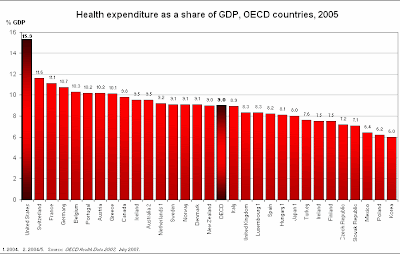From
THE PROGRESS REPORT:
Dueling Recovery Bills
Last week, the Senate took up the American Recovery and Reinvestment Act, an economic stimulus package aimed at boosting the tanking economy. The legislation that emerged from the Senate debate, which is up for a procedural vote today, is substantively different from that which passed the House in January. The differences are due to an effort by a group of "centrist" senators -- the 'gang of moderates' -- to rein in what they characterized as unnecessary spending in the House version. Led by Sens. Ben Nelson (D-NE) and Susan Collins (R-ME), the gang crafted a compromise that cut spending in the bill by about $100 billion, reducing the total cost to about $780 billion. However, that total does not factor in two new tax breaks that the Senate added -- one for new car purchases and another for home-buyers. With these tax breaks added in, the estimated cost stands at about $827 billion. As a result of the "compromise," though,
the Senate bill is now inferior to the House's in terms of stimulative effect. More than two-thirds of the cuts are in areas that would provide the most effective stimulus. As the Center for American Progress' Michael Ettlinger wrote, "there are other smaller cuts in the remaining third that make little sense if the goal is, in fact, to weed out the least effective stimulus provisions."
THE DIFFERENCE IS JOBS: The unemployment rate is currently at 7.6 percent, after employers shed 598,000 jobs in a "brutal January." This number jumps to 13.9 percent when the underemployed -- those working part-time who want to be working full-time, or those who have simply given up on finding a job -- are factored in. Over the last three months, 1.8 million jobs have disappeared. As the Center for American Progress' Heather Boushey pointed out, "the United States has not seen job losses of this magnitude over a three month period since 1945." This highlights why job creation in the stimulus package is critical, yet the
Senate bill would create between 430,000 and 538,000 fewer jobs than its House counterpart. Of course, as economist Brad Delong noted, "relative to the alternative of no bill we do boost employment in America a year from now by on the order of 3 million." But with potential job losses expected to continue "for another year nationwide" those jobs would mean a lot, and the stimulus should be aimed at those areas in which it can do the most good.
OUT -- STATE AID AND EDUCATION: Of the $83 billion cut by the Nelson-Collins gang, $40 billion of it was for state stabilization funding. This is incredibly important funding meant for "helping states and localities avoid wide-scale cuts in services and layoffs of public employees." There are 46 states facing budget shortfalls this year or next, and at least 41 states anticipate shortfalls for fiscal 2010 and beyond. Economist Mark Zandi calculated that
every dollar invested in aid to the states has a return of $1.36. Also, this funding moves into the economy quickly, as "states that receive a check from the federal government will quickly pass on the money to workers, vendors, and program beneficiaries." A second area hard-hit by the gang's compromise is education (which the state funding would also have gone towards); the Senate bill "cuts all $16 billion from the original bill for K-12 school construction, [and] trims more than $1 billion from Head Start programs for youngsters." But as the Center on Budget Policy and Priorities pointed out, "thirty-four states have cut education or proposed such cuts because they face massive, devastating budget deficits in this recession." These cuts come in the form of per-pupil expenditure, school meal programs, and teacher layoffs. As one school board president said, "We are at that point where we have no other place to go (for cuts)." This money would have had immediate effects "in terms of forestalling layoffs and really preventing the symptoms of recession from exacerbating the economic woes that we're currently experiencing," CAP's Raegen Miller noted.
IN --
INEFFECTIVE TAX BREAKS: While state aid and education were cut, added into the bill in the Senate were tax breaks that will do little to jumpstart the economy. The Senate found just $18 billion in tax breaks it was willing to cut, but among these was a scaling back of the Child Tax Credit expansion proposed by the House. The House bill eliminates the income floor for the credit in 2009 and 2010, opening it up to the working poor who are most apt to spend it; the Senate set an income floor of $8,100. The Senate also included patching the Alternative Minimum Tax, which takes place every year and can hardly be called stimulative. Finally, the Senate included a $15,000 home-buyers credit, in an attempt to address the housing crisis. While it is undeniable that a fix for housing must be found, this tax credit is not it. It is not likely to incentivize anyone who was not going to purchase a home anyway, and as Dean Baker noted, the credit will "cost more than promised." Furthermore, it can go to any home-buyer, "the vast majority of whom will be people who already own a home. If a person buys a home, but sells their current home, it has no net effect on the market." In the end, it will amount to little more than a "house-flipping subsidy."

